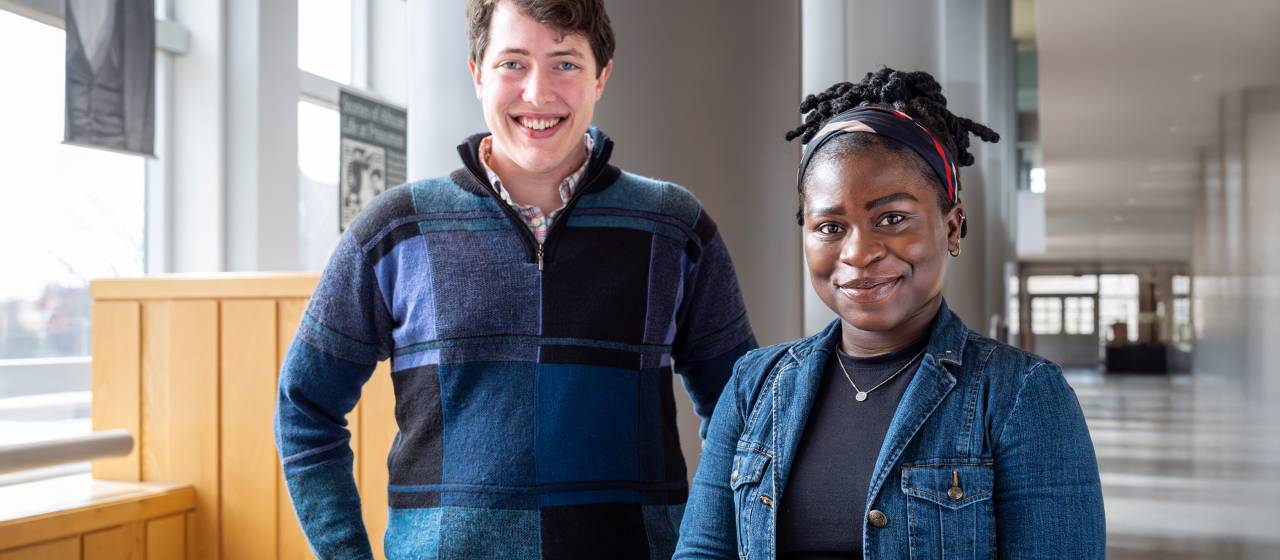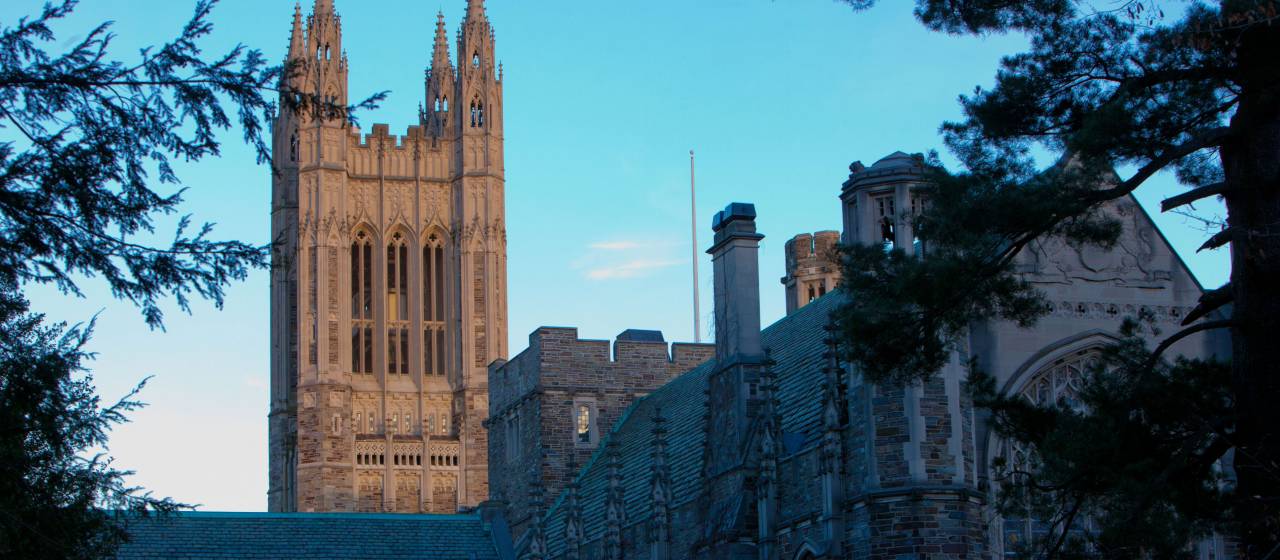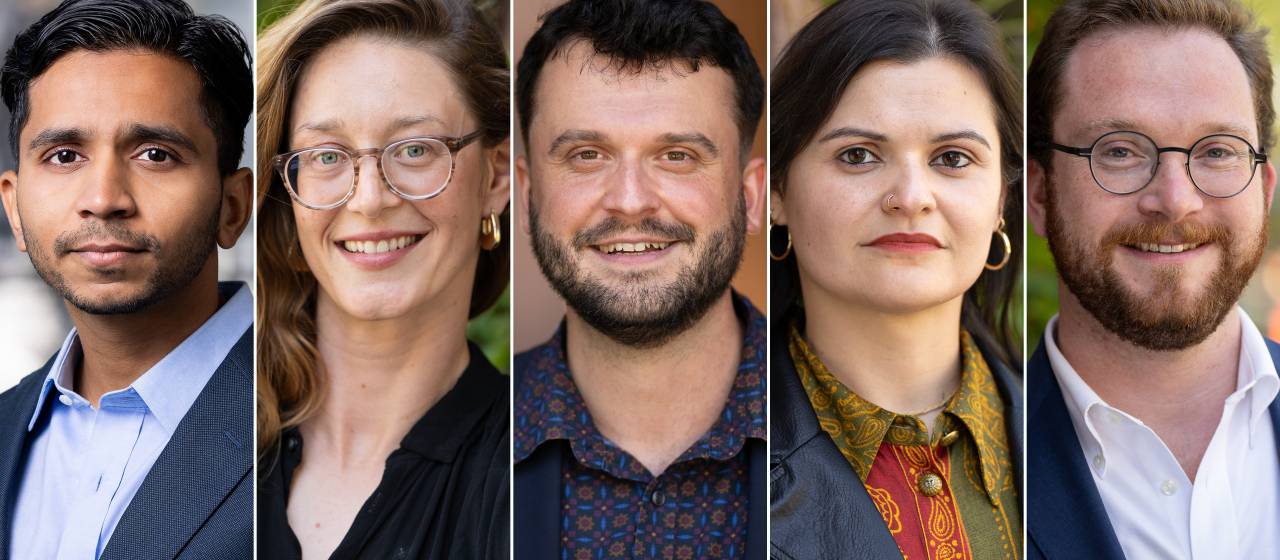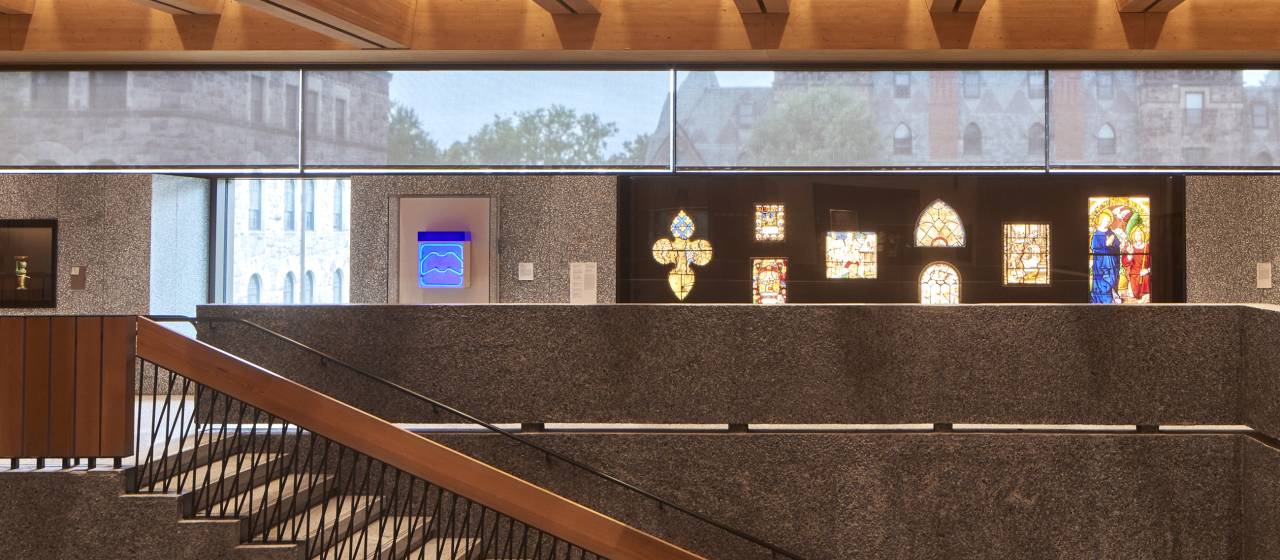Two seniors receive Dale Fellowships to pursue original projects after graduation
Class of 2025 members Azi Jones and Patrick Newcombe are the latest recipients of the Martin A. Dale ‘53 Fellowship, which funds yearlong independent projects for members of each senior class in the year following their graduation.
The Dale Fellowship, created by 1953 Princeton alumnus Martin Dale, provides a $40,000 grant to spend a year on “an independent project of extraordinary merit that will widen the recipient’s experience of the world and significantly enhance the student’s personal growth and intellectual development.”
Fourteen Princeton sophomores also received $7,000 Dale Summer Award stipends for smaller projects they will complete over the summer. The 2025 Dale Summer Award recipients are: Ava Adelaja, Alisha Andrade, Georgina Domingo Alsina, Alexandra Gayer, Katherine Hwang, Sam Lee Regan, David Nagley, Connor Odom, Katriona Page, Joseph Roberts, Edith Simecek, Lucia Tsurumaki, Tatyana Wabwire and Isabel Yates.

Patrick Newcombe and Azi Jones
Azi Jones
Jones graduated from Princeton in May with a degree in African American studies and a minor in visual arts. She has extensive creative experience as a visual artist, dancer and curator for student organizations, Lewis Center for the Arts’ student-led projects, and professional art organizations in the U.S. and Caribbean.
For her Dale project, “LEHWE,” Jones is curating a traveling pop-up exhibit series on Caribbean contemporary art and programming at galleries in the Bahamas, Jamaica and Trinidad and Tobago.
Jones will travel among the countries to meet artists and visit exhibition sites. Her goal is to hold three editions of the exhibit series featuring a set lineup of emerging artists and a changing rotation of established artists unique to each location.
In her application essay for the Dale Award, Jones, who is originally from Kingston, Jamaica, wrote that “Caribbean contemporary art and its talents are too often exported from the region.” She hopes to counter the idea that being a curator means leaving behind one’s community — instead, she hopes to build one.
Her essay explained that the title “stems from regional Anglophone dialect” with multiple meanings, as “Lehwe” can be translated to indicate a beginning (“let me” or “let us”), “frustration or desire” or “a demand for respect” (“let me go!” or “let us do it!”).
“LEHWE’s inclusion of a ‘me’ and a ‘we’ in my translation stands at the center of the show’s curatorial vision,” she wrote. “These pairings aim to highlight the exhibition’s most central goal: to feature a future of Caribbean art that is thriving — and not in a vacuum.”
Last summer, Jones interned at the National Gallery of Jamaica and the Barbados Museum and Historical Society, where she helped museum registrars ship artwork internationally and conceptualized a curatorial model to uplift Caribbean artists in their countries of origin.
In her letter of recommendation for the award, Anna Arabindan-Kesson, an associate professor of African American studies and art and archaeology, said Jones’ project will “cultivate community, generational connection and professional development for young Caribbean artists.”
“Her project has the potential to make an important intervention in the cultural landscape of the Caribbean, providing opportunities to nurture and sustain artistic production … while also ensuring international exposure and access in ways that do not necessarily require young Caribbean artists to first leave their homes to find ‘successes’ elsewhere,” Arabindan-Kesson wrote.
On campus, Jones was a McCrindle intern at the Princeton University Art Museum and a processing assistant in the photography archives of the Princeton University Library’s Special Collections. She served on the Department of African American Studies’ undergraduate board of advisers and as a member of BodyHype Dance Company, where she was previously the creative director.
As an artist and curator with The Black Arts Collective, Jones has conceptualized and produced numerous exhibitions for the student group. In 2023, she also directed, edited and produced “Lessons in Exile,” an award-winning short film sponsored by the Lewis Center for the Arts with a grant from the Rita Allen Foundation. She has also interned at museums and galleries based in New York, Boston, Jamaica and Barbados.
Among her other honors, Jones has received funding for summer independent work through the Lewis Center’s Sam Hutton Fund for the Arts. She also won this year’s Lewis Center’s Lucas Award in Visual Arts and was recognized by the center for outstanding work her first and sophomore years.
Patrick Newcombe
Newcombe graduated from Princeton in May with a degree in ecology and evolutionary biology and minors in African studies and in history and the practice of diplomacy. He served as the president of the Princeton Birding Society and was a 2024 Udall Undergraduate Scholar.
For his Dale project, Newcombe is traveling to South America to interview local conservationists committed to protecting endangered bird species in the Andes Mountains, including royal cinclodes while based out of the Wayqecha Cloud Forest Biological Station in Peru, jocotoco antpittas at the Tapichalaca Reserve in Ecuador and red-fronted macaws at the Red-fronted Macaw Reserve in Bolivia.
Newcombe, who previously conducted field research in Peru and Costa Rica, said his interest in local conservationists intensified after a fall break trip to Berlin in 2022 for the course “International News: Migration Reporting,” taught by Deborah Amos, Ferris Professor of Journalism in Residence, where he interviewed sources about the environmental impacts of war in Ukraine.
“I will ask each subject, personally, what their efforts mean to them; what they get out of it. These insights will ground my future environmental work (whether researching, fundraising, or telling stories for conservation) in real experiences with what happens on-the-ground,” Newcombe wrote in his Dale application essay.
Newcombe also studied in Kenya for a Global Seminar through the Princeton Institute for International and Regional Studies (PIIRS). At Mpala Research Centre, he worked with researchers in the labs of Mary Stoddard and Robert Pringle, professors of ecology and evolutionary biology.
He then spent two summers in Mozambique, first as a sophomore with the Pringle Lab and again for his senior thesis with David Wilcove, professor of ecology and evolutionary biology and public affairs and the High Meadows Environmental Institute. In 2024, Newcombe received the High Meadows Environmental Institute’s Becky Colvin Memorial Award, which funded his thesis research at Mozambique’s Gorongosa National Park on how termite mound vegetation supports the diversity and distribution of birds in African savanna ecosystems.
In his letter of recommendation for the award, Wilcove praised Newcombe’s project as a reflection of “the broad perspective on environmental issues” he brings to his work.
"Patrick is a very talented scientist whose interests go well beyond just biology. He is keenly aware of the importance of understanding the social and policy contexts of conservation issues if one hopes to find equitable and durable solutions,” Wilcove wrote.
While at Princeton, Newcombe was a member of the “Princeton Tiger Shrikes” student birding team, which won the New Jersey Audubon’s World Series of Birding and the annual competition’s Urner Stone Cup in 2022.
As president of the Princeton Birding Society, Newcombe monitored bird collisions and partnered with the Stoddard Lab, as well as Princeton’s Office of Sustainability and the Council on Science and Technology, to help establish the Princeton Better for Birds Project in 2022. The collaborative effort reduced incidents by designing and installing bird-safe film in glass windows for both existing and new buildings across campus.
On campus, Newcombe was a senior international policy associate with the Liechtenstein Institute on Self-Determination in the Princeton School of Public and International Affairs (SPIA). He previously served as a member and co-convener of the Religious Life Council, an interfaith student fellowship.
Newcombe has published his writing in various popular news outlets and academic journals, including the Journal of Field Ornithology and Biology Letters, among others. He received this year’s T. A. Barron Prize for Environmental Leadership from the High Meadows Environmental Institute.
Latest Princeton News
- Michael Skinnider wins 2025 Packard Foundation Fellowship
- A ‘town square for the arts and humanities’: The new Princeton University Art Museum shares opening details
- The ‘Many Minds, Many Stripes’ conference celebrating Graduate School alumni is underway on campus
- Society of Fellows in the Liberal Arts welcomes new scholars
- Princeton alumni Nabarun Dasgupta '00 and Sébastien Philippe *18 win MacArthur 'genius' grants
- Venture Forward gifts name multiple spaces within the new Princeton University Art Museum













